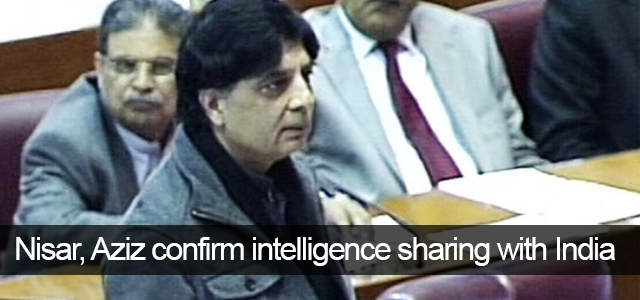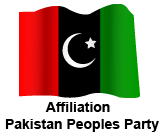 Two key government ministers confirmed on Tuesday reports about unprecedented intelligence sharing with India on a terrorist plot hatched by a Pakistan-based militant group.
Two key government ministers confirmed on Tuesday reports about unprecedented intelligence sharing with India on a terrorist plot hatched by a Pakistan-based militant group.
Federal Minister for Interior Chaudhry Nisar Ali Khan told Senate that some 10 to 15 people might have crossed the border and intelligence sharing had taken place between Pakistan and India in this regard.
“It is suspected that 10 to 15 people have crossed the border. I confirm this,” Chaudhry Nisar said in reply to a question asked by PML-Q’s Mushahid Hussain Sayed.
The interior minister said that such activities were being carried out by “non-state actors” but Pakistan had to take the burden of responsibility.
He said that besides India, more intelligence sharing was taking place with Afghanistan as Pakistan had a clear policy that it would not let its soil be used for carrying out terrorist activities in any other country.
According to Indian media reports, Pakistan’s National Security Adviser Nasir Khan Janjua shared the intelligence input with his Indian counterpart Ajit Doval that 10 militants had entered the Indian state of Gujarat for a possible terror attack. The terrorists belonged to the Lashkar-e-Taiba and Jaish-e-Mohammad militant groups.
PML-Q’s Mushahid Hussain had asked the interior minister if he could confirm the Indian media reports and if the alleged terrorists belonged to any of the banned outfits.
Chaudhry Nisar had come to the Senate to respond to questions of senators on his written statement about the implementation of National Action Plan (NAP).
Earlier in the day, while responding to the same question, Adviser to the Prime Minister on Foreign Affairs Sartaj Aziz had stated that sharing of intelligence among various nations was a routine practice and this happened around the world. “However, this time it was somehow leaked to the media,” he said during a joint news conference with the visiting British Foreign Secretary Philip Hammond at the Foreign Office.
Later, speaking in Senate, the adviser rejected a recent statement of Indian Defence Minister Manohar Parrikar that Pakistani establishment had supported “non-state actors” who carried out the terror attack on the Pathankot Air Force base in India in January.
Mr Aziz said that the Indian minister’s statement was based on the old narrative that the non-state actors carried out attacks in India with the help of Pakistan’s state.
“I deny this (Indian minister’s statement). They talk about our non-state actors, which are not in our complete control, whereas we talk about their state actors. We have already given dossiers (to the international community) regarding the role of RAW in Karachi and Balochistan,” he said, adding: “Do not throw stones on others while sitting in a glass house.”
About talks between Taliban and Afghan government, the adviser said that Pakistan was only playing the role of a facilitator and it was not solely responsible for the resumption of dialogue.
He also dispelled the impression that Pakistan had influence over Taliban, saying that they were never under complete influence of Pakistan even in the past when they were ruling Afghanistan as they did not pay any heed to Islamabad’s repeated requests not to destroy Buddha statues in Bamiyan Valley.
Mr Aziz also ruled out the possibility of nuclear technology transfer to any other country, including Saudi Arabia.
“We have a clear policy. Saudi Arabia is our friend but we will not share our nuclear technology with anyone,” he said in response to a reported statement of US Secretary of State John Kerry about the possibility of transfer of the technology to Saudi Arabia.
NATIONAL ACTION PLAN: Responding to questions of senators on the performance of his ministry in the implementation of NAP, the interior minister said that of 20 points of NAP, 10 were related to provinces but he did not indulge in the blame game as it would only harm the country’s interests and eventually encourage terrorists. He admitted slow progress in the implementation of five points, terming the progress on other points as “satisfactory”.
The interior minister also admitted that there had been a “slow progress” on the issue of Fata reforms.
Chaudhry Nisar claimed that the government had made good progress on Madressahs’ reforms, saying the provincial governments would soon be taken on board on this issue.
The minister said that National Counter-Terrorism Authority (Nacta) was functioning in accordance with the law as an independent and autonomous organisation. He said the finance ministry had already provided Rs1.3 billion for Nacta, but it was insufficient.
The interior minister criticised previous two governments for not making Nacta functional.
In reply to a question of PPP’s Sehar Kamran that radio of the militant Islamic State (IS) group, “Voice of Caliphate”, could be heard in Pakistan through which Taliban chief Mullah Fazlullah was propagating his views, the minister said he would raise this matter with Afghanistan with the help of the ministry of foreign affairs as signals were coming from Afghanistan in some border areas.
About presence of IS in Pakistan, the minister said that at present some 40 terrorist groups were operating in the country and some of these groups used names of some high-profile terrorist organisations, including IS.
Chaudhry Nisar said that it was true that intelligence agencies and counter-terrorism departments in Punjab and Sindh had busted some small networks, but they had been formed by some local people belonging to some local organisations such as Jamaatud Dawa.
The minister said that IS people were at present fighting battles for their survival in Middle East and North Africa and they had no time to focus on other countries.
“Why are we inviting IS’s attention towards Pakistan by asking questions about their presence in the country?” he asked.
Meanwhile, Shahi Syed of Awami National Party (ANP) praised the government’s steps for eradication of terrorism from the country. He said that the credit of launching Operation Zarb-i-Azb and an operation in Karachi went to the PML-N government. He said that today those people were carrying out actions against terrorists who had been considered pro-Taliban in the past.
Same version of the article appeared in Dawn


